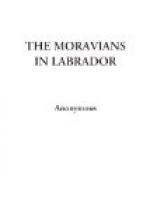But at Hopedale the work of the Lord went steadily forward; several were added to the church, and those who departed gave good evidence that they went to the Saviour, particularly Benjamin, who died of an inflammatory fever in the month of February. From the first he was convinced that his dissolution was at hand. Being asked whether he thought he should go to Jesus, he cheerfully answered in the affirmative. After some conversation on the subject, the missionary present sung that verse:—
“The Saviour’s
blood and righteousness
My beauty are—my
glorious dress;”
and others of the same import, in which he joined with great fervency of devotion. He then, of his own accord, began to sing other hymns, “Christ my rock, my sure defence” “Jesus my Redeemer liveth” “No, my soul he cannot leave” “Thy blood, thy blood, the deed hath wrought.” Before his departure he was frequently delirious; but even during this period of his illness, we, and the Esquimaux who visited him, were delighted and greatly affected by the subjects his spirit seemed always engaged in. His thoughts were occupied with nothing but Jesus Christ his Saviour; and he kept repeating the most beautiful and appropriate texts of Scripture: “This is a true and faithful saying, and worthy of all acceptation, that Christ Jesus came into the world to save sinners.” “The blood of Jesus Christ, the Son of God, cleanseth us from all sin;” never failing to add, “Yes! on account of my sins he shed his blood.”




